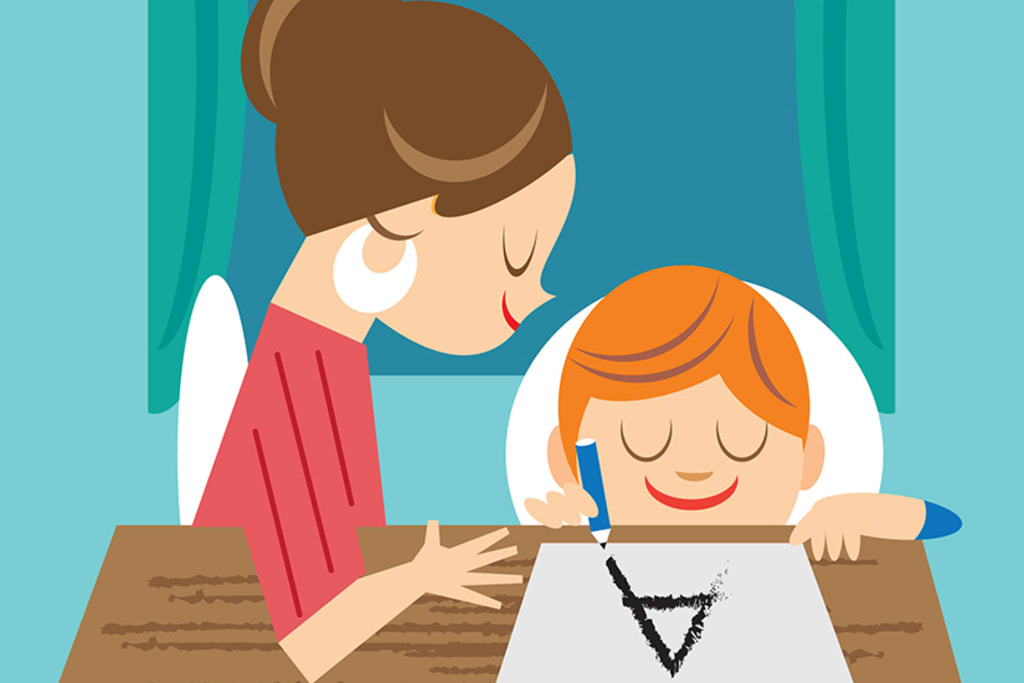How to help your child learn with pleasure and succeed in school
.

In today's school and family environment, with high pressure and high stakes, it can be difficult to know what parenting strategies really promote learning. A successful school experience is not just about results. Ideally, the child learns how to learn, retain information, think independently, ask questions, and develop a growing sense of competence. How can we, as parents, make sure that we provide the right environment for our children to start school right, to maintain their enthusiasm and drive for learning?
Of course we are talking about a complex process, but there are some principles that can help parents focus on what is most important for school success. Ioana Marinescu is an accredited personal development counselor and trainer. Since the beginning of 2021, he has been a coach - assistant in the divorce support group, a support program through the coaching method, where he assists and counsels people who are going through the trauma of divorce. More about Ioana Marinescu, on the author's page . CONTENTS: Recommendations to help your child learn Things to avoid What to do to motivate your child to learn for fun Don't show off grades and grades Focus on the process, not the results Be a role model Set goals with your child Look at things in the long run Identify your child's learning style Take learning out of school Good organization solves half of the problem Prepare your child for learning Conclusion Recommendations to help your child learn Focus on the process, not the outcome Encourage your child to be autonomous Look at things in the long run Maintain a healthy rest schedule Love the child you have, not the child you want to have Things to avoid Constantly exceeding the bedtime Praise notes and results Comparisons with other children Rewarding performance Very young children are naturally motivated to learn and explore in order to get to know the world around them. As they fall and rise and experience various successes and failures, they gain a sense of confidence, competence, and self-efficacy. However, somewhere in kindergarten, parents and teachers begin to undermine this natural course of things, devaluing the learning process and replacing it with a race for final results. Suddenly, intrinsic motivators of natural curiosity, competence, and self-efficacy are less valuable than extrinsic motivators, such as stars, dots, dots, and notes. Unfortunately, extrinsic motivators undermine children's desire to learn in the long run.
If we want children to remain curious and eager to get to know each other, we need to take certain measures and control the impulses that we have taken in our turn from society and from past generations. What to do to motivate your child to learn for fun Don't show off grades and grades You can appreciate the results, but try to avoid showing them in plain sight or bragging about them on social media. It does not give your child the impression that you appreciate the grades the most, because they are a faulty and incomplete indicator of learning. Everything about extrinsic motivation reduces long-term motivation, undermines creativity and encourages small tricks to get better grades.
Praising the results of children in circles of friends or on social media only fuels competition between parents, increases the pressure on children and teaches them that the love and approval of adults depends on the contents of the notebook.
Focus on the process, not the results It is recommended that you focus on the process that led to that grade and ask your child questions such as: What did you do to get that grade? What learning methods did you apply? What will you do differently next time? The best question parents can ask when they are faced with a grade, whether it is high or low, is: How will you use this experience next time? This technique works especially well for anxious and perfectionist children, who may get stuck in a negative feedback loop, becoming obsessed with results and grades. Shifting attention to the process can alleviate their anxiety, especially when we help them prioritize the learning aspects they can control.
Be a role model Talk about your own failures and successes with your children, showing them that you are also involved in their learning process and that you are no stranger to what they are going through. If they see that their parents have the courage but also expose their vulnerabilities, children will become more tolerant of themselves, but also more interested in learning.
Set goals with your child An easy way to focus on the process is to set goals, both individually and as a family. Try to do this at the beginning of a new school year, on the first day of the month, or at the beginning of a new season. Keep the conversation loose, without pressure. This process is not about getting better grades, but about supporting family learning.
One type of goal would be "I will ask for help in math more often" or "I will plan an extra meditation session a week" or "I will practice multiplying three more times this month." One of the goals should be a challenge. We can't hope to convince our children to be brave and inventive unless they see us doing the same thing, so set goals that get you out of your comfort zone. Take dance lessons, learn a foreign language, try a new activity or a hobby. Before setting new goals, make a family assessment of how everyone has coped with previous goals. Review these goals once a month or once a semester. If you fail to achieve your goals, talk about reasons and what you intend to do differently next time. If you succeed, celebrate this achievement!
Look at things in the long run The education and upbringing of the child requires long-term efforts, and improvements do not take place on a daily basis. Think about where you would like your child to be in a year or five in terms of competence and growth. What is more important for you, to quickly solve the homework you forgot about, possibly to do it yourself or to develop a strategy to not forget to do your homework? Talk to your child about your own successes or failures, about the difficulties you face at work, about your fears and challenges. Identify your child's learning style Each of us has a preference for a certain learning style. Some for visual learning, others for auditory learning, others learn through writing and reading. By identifying your child's learning style, you will be able to show them how to study in the way that suits them best. For example, visual children study better with diagrams, pictures, and other graphic content, while hearing children prefer lectures, music, and other audio. Take learning out of school One of the biggest mistakes teachers and parents make when it comes to learning is limiting it to the classroom and textbook lessons. While the classroom will probably be the main source of instruction, intellectual, social, and academic growth should extend beyond the walls of the classroom. Provide your child with learning experiences in unconventional environments - on hikes and trips to the zoo or botanical garden, and turn any experience into a learning opportunity. Good organization solves half of the problem Children are often overwhelmed by the need to organize their books, notebooks, and homework, and this can block them and cause them to delay learning. They feel unmotivated and, as a result, do poorly in school. Help your child divide large tasks into smaller pieces. In this way, he will not be overwhelmed and, after completing a task, will be motivated and disciplined to continue. Also, make sure that you help your child to manage his / her study time efficiently. Prepare your child for learning Sometimes the most basic requirements for learning are neglected or overlooked. Good sleep and proper nutrition are the foundation of excellent cognitive activity. Studies show that sleep plays an important role in memory. Lack of adequate sleep affects mood, motivation, thinking and perception of things. So make sure you give your child at least eight hours of sleep a night. Also, healthy nutrition, rich in whole fiber, cereals and protein, as well as low in sugar improves the brain activity and mental capacity of children. Conclusion Every child has the potential to learn and be a good student. It is up to the parents to develop this potential, creating the right environment for them, constantly encouraging and supporting them. By developing healthy habits, children develop a penchant for learning and are more likely to enjoy learning with pleasure.
About the Creator
Rebecca Maria
Hi! My name is Rebecca and I'm good at black and white drawing. On this site I will write interesting things and things that some of you do not know. I hope you enjoy You can write me in the comments what would interest you.Thank you .






Comments
There are no comments for this story
Be the first to respond and start the conversation.